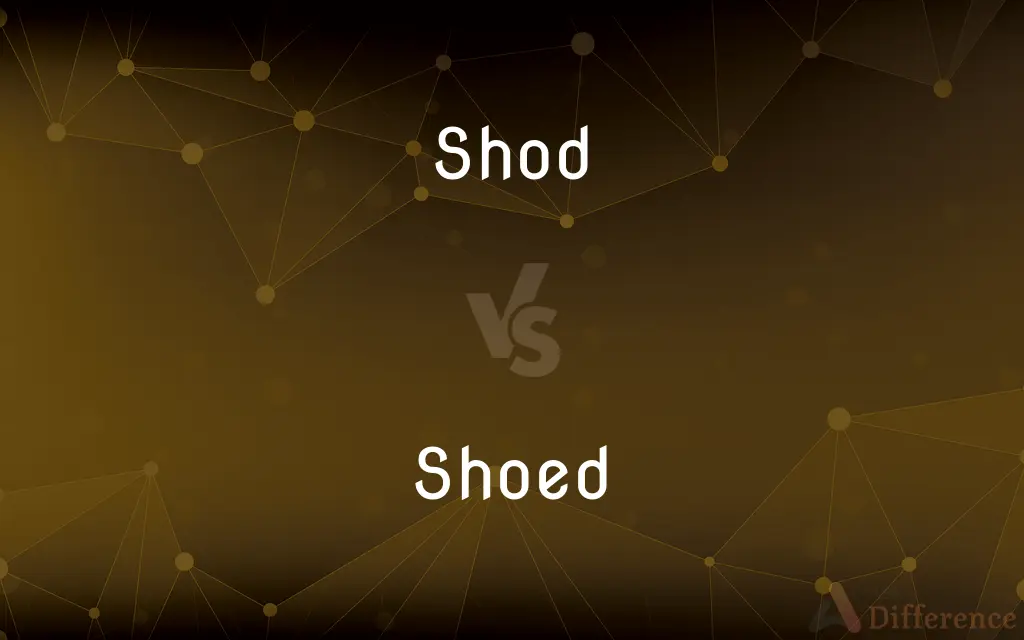Shod vs. Shoed — What's the Difference?
Edited by Tayyaba Rehman — By Fiza Rafique — Updated on March 27, 2024
"Shod" is the past tense of "shoe" used for fitting shoes, while "shoed" is less common and sometimes used similarly.

Difference Between Shod and Shoed
Table of Contents
ADVERTISEMENT
Key Differences
"Shod" is traditionally used as the past participle and past tense of the verb "to shoe," particularly in the context of fitting horseshoes or providing someone with footwear. It emphasizes the completion of the action of fitting shoes or horseshoes. On the other hand, "shoed" is an alternative but less common form of the past tense of "to shoe." It can be used in similar contexts as "shod," but its usage is not as widespread or historically deep-rooted.
While "shod" conveys a sense of being equipped or furnished with shoes, emphasizing a state of readiness or preparation, "shoed" tends to be used more casually or in less formal contexts. The choice between "shod" and "shoed" can reflect stylistic preferences or the desired tone of the communication.
In literature and historical texts, "shod" is frequently found to describe characters or animals that have been provided with shoes or horseshoes, contributing to a more archaic or formal flavor in the narrative. "Shoed," however, might appear in more contemporary or informal settings.
The distinction between "shod" and "shoed" also highlights the evolving nature of language, where both forms coexist, but one may be favored over the other due to tradition, frequency of use, or context-specific conventions. Choosing "shod" or "shoed" depends on the writer's or speaker's preference, the audience, and the context.
Comparison Chart
Usage
Traditional past tense/participle of "to shoe"
Less common alternative past tense of "to shoe"
ADVERTISEMENT
Context
Often used in formal or historical contexts
Used casually or in less formal contexts
Connotation
Implies readiness or being equipped
Similar to "shod" but with less historical depth
Preference
Favored for its historical continuity and conciseness
Chosen based on stylistic preferences or for a contemporary tone
Examples
"The horse was shod last week."
"He shoed the horse before the race."
Compare with Definitions
Shod
Equipped or furnished with shoes.
The soldiers were shod with new boots.
Shoed
Made to wear shoes.
The children were quickly shoed before school.
Shod
Having a particular type of footwear.
They were shod in sturdy boots for the hike.
Shoed
Fitted with shoes in a past instance.
Yesterday, he shoed the family's horses.
Shod
Made to wear shoes.
By the end of the day, all the horses were shod.
Shoed
Provided shoes as part of an outfit.
He was fully shoed for the expedition.
Shod
Provided with a covering or protection for the feet.
Shod with thick socks, they braved the cold.
Shoed
Had shoes put on.
The horse was easily shoed by the experienced farrier.
Shod
Fitted with shoes or horseshoes.
The blacksmith expertly shod the horse.
Shoed
Equipped with footwear.
She shoed herself with sandals for the beach.
Shod
Past tense and a past participle of shoe.
Shoed
Simple past tense and past participle of shoe
Shod
Wearing shoes.
Shoed
Wearing footgear
Shod
Having tires equipped.
Shod
Simple past tense and past participle of shoe
Shod
F Shoe.
Shod
Wearing footgear
Shod
Used of certain religious orders who wear shoes
Common Curiosities
Can objects other than feet be described as shod?
Typically, "shod" and "shoed" refer to feet or hooves, emphasizing footwear or horseshoes.
What does it mean to be shod?
To be shod means to be equipped with shoes or horseshoes.
Why is "shod" preferred over "shoed"?
"Shod" is preferred for its historical continuity, conciseness, and traditional use in formal contexts.
Is "shod" only used for horses?
While often associated with horseshoes, "shod" can also refer to people being equipped with footwear.
How do I choose between "shod" and "shoed"?
Choose based on the formality of the context, historical preference, and the tone you wish to convey.
Can "shod" imply a type of footwear?
Yes, "shod" can imply being equipped with a specific type of footwear, not just horseshoes.
Is there a difference in pronunciation between "shod" and "shoed"?
No, their pronunciation is quite similar, with only slight variations depending on regional accents.
Can "shoed" be used interchangeably with "shod"?
Yes, "shoed" can be used similarly to "shod" but is less common and sometimes considered less formal.
Are there modern contexts where "shod" is still preferred?
Yes, in formal writing, historical discussions, and when referring to the act of fitting horseshoes, "shod" is often preferred.
What implications does being shod have for an individual or animal?
Being shod implies that the individual or animal is prepared or equipped for certain activities, offering protection and support for the feet or hooves.
Are there any contexts where "shoed" is more appropriate than "shod"?
"Shoed" might be more appropriate in casual or contemporary narratives.
How does the choice between "shod" and "shoed" affect the tone of writing?
Using "shod" can lend a more traditional or formal tone, whereas "shoed" may make the narrative feel more contemporary or relaxed.
Is the use of "shoed" considered incorrect?
Not incorrect, but "shoed" is less traditionally used and may be seen as less formal.
Is there a regional preference for using "shod" over "shoed"?
There may be regional preferences, with "shod" being more universally recognized and preferred in formal English.
Can "shoed" refer to providing someone with shoes as assistance?
Yes, "shoed" can refer to the act of providing shoes to someone, similar to "shod."
Share Your Discovery

Previous Comparison
Bookshop vs. Library
Next Comparison
Baguette vs. BatardAuthor Spotlight
Written by
Fiza RafiqueFiza Rafique is a skilled content writer at AskDifference.com, where she meticulously refines and enhances written pieces. Drawing from her vast editorial expertise, Fiza ensures clarity, accuracy, and precision in every article. Passionate about language, she continually seeks to elevate the quality of content for readers worldwide.
Edited by
Tayyaba RehmanTayyaba Rehman is a distinguished writer, currently serving as a primary contributor to askdifference.com. As a researcher in semantics and etymology, Tayyaba's passion for the complexity of languages and their distinctions has found a perfect home on the platform. Tayyaba delves into the intricacies of language, distinguishing between commonly confused words and phrases, thereby providing clarity for readers worldwide.
















































